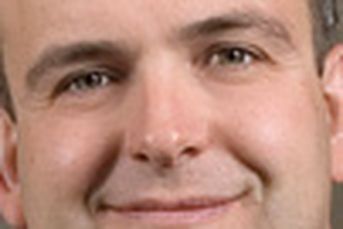Schwab edges Fidelity in breakaway broker race
The Charles Schwab Corp. edged out Fidelity Investments during the first quarter in the battle to service the small but growing number of stockbrokers who are leaving their Series 7 licenses behind to become independent investment advisers.
The Charles Schwab Corp. edged out Fidelity Investments during the first quarter in the battle to service the small but growing number of stockbrokers who are leaving their Series 7 licenses behind to become independent investment advisers.
Schwab attracted 38 teams of so-called breakaway brokers, controlling about $2.7 billion of assets, between the start of the year and the end of March. Fidelity corralled commitments from 33 teams with $2.2 billion in assets.
If the quarterly numbers are annualized, both firms are ahead of their 2008 pace, a sign that the much-anticipated but slower-than-expected migration of brokers may be accelerating now that markets appear to be stabilizing and brokers feel more confident about making shifts in their business models.
Measured by assets, Boston-based Fidelity is slightly ahead of its 2008 pace when it brought in $6.1 billion from 102 broker teams. Schwab of San Francisco last year helped 134 teams of “breakaway brokers” with $13 billion of assets leave the likes of Merrill Lynch & Co. Inc., Morgan Stanley, Smith Barney, UBS Wealth Management and other brokerage behemoths.
“The next six to 12 months will be very important,” said J. Thomas Bradley Jr., president of Jersey City, N.J.-based TD Ameritrade Institutional, noting that custodians and independent broker-dealers are investing heavily in marketing the independent model to traditional brokers. “We’re all fighting for market share, and we’ll all get a good piece of business.”
Mr. Bradley’s unit, a division of Omaha, Neb.-based TD Ameritrade Holding Corp., captured assets from 16 brokerage teams in the first quarter. The company doesn’t break out assets and didn’t disclose its breakaway-broker total for 2008.
The Bank of New York Mellon Corp.’s Pershing Advisor Solutions LLC attracted seven teams of brokers with about $1 billion to its custody platform in the first quarter. In all of 2008, Jersey City-based Pershing captured 16 brokerage teams with more than $4 billion in assets.
To be sure, the breakaway-broker phenomenon barely moves the needle when stacked against the total amount of assets that large brokers hold in custody for independent advisers. Schwab, for example, ended the first quarter with about $457 billion in assets from registered investment advisers, while Fidelity’s bordered on $300 billion.
The actual total that breakaway brokers will bring to custodians this year could change with the market and final makeup of their teams, said Bing Waldert, a director at consulting firm Cerulli Associates Inc. in Boston.
Charles Goldman, the head of institutional platforms at Fidelity, has long tried to lower expectations about a rapid ingathering of breakaway-broker assets. The press “has so overblown the breakaway broker phenomenon,” he said in an interview this month, noting that the bulk of disgruntled brokers tend simply to move to a competing broker-dealer offering a better deal.
Nevertheless, his firm and its competitors are devoting significant parts of their tightly controlled budgets to winning business from the brokers and helping them with the transition.
Brokerage teams that go independent appear to retain a much higher proportion of the clients they want than those that move from one wirehouse to another, said Mr. Waldert. “Clients see the wirehouses as complicit in many of the problems facing the U.S. economy right now and probably don’t see the point of their brokers’ moving from one wirehouse to another,” the consultant said.
Mr. Waldert characterized the model brokerage team that chooses independence as one that maintains relative autonomy within its current firm, sits in corner offices and brands itself under its own name as a division of the wirehouse. “Custodians have a lot of work in teaching them how to run all the elements of a business, but it’s an easier win than trying to win an adviser from a rival custodian,” he said.
“The notion that wirehouse brokers were going to be leaving en masse was always unlikely,” said Dorie Rosenband, a 12-year veteran of Smith Barney who in March set up an RIA in New York called &Wealth Partners LLC. “A lot of them like the markets, but being responsible for running every aspect of a business is not in the gene profile of most people at brokerage firms.”
Ms. Rosenband, who said she is still deep in the process of converting the part of her client base that is amenable to receiving wealth management advice, last week was scheduled to be the guest speaker on a Schwab webcast, “Realities of the Transition Experience,” aimed at breakaway brokers called, It is the first of a three-part “Backing the Independent” webinar series Schwab is holding this month.
Brokers are flocking from Wall Street to Schwab at “rates never seen before,” Schwab chief executive Walt Bettinger said at the company’s semiannual Business Update conference for investors two weeks ago.
E-mail Jed Horowitz at [email protected].
Learn more about reprints and licensing for this article.




